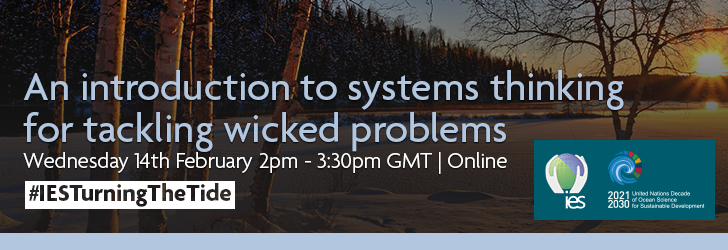Systems thinking is essential for unlocking multifunctional solutions to the interlinked issues of climate change, biodiversity loss and environmental pollution. The IES's recent report Transforming the planet: Our vision for the future of environmental science outlined the importance of developing systems thinking skills and exploring practical applications of systems thinking. This event will provide an exploration of some of these themes.
We are increasingly facing ‘wicked problems’. They are stubborn, challenging and often have to be managed rather than solved. They frequently involve interlinked issues, multiple agencies with different perspectives, conflict over desired outcomes or the means to achieve them, power relations making change difficult, uncertainty about the likely effects of proposed changes, and scepticism about the possibility of beneficial change.
While traditional scientific, policy and management approaches can make useful contributions, we need something in addition to these if we want to address more of the complexity and conflict associated with wicked problems. Systems thinking can help. In this talk, Gerald Midgley will introduce a framework of systems thinking skills, plus a variety of systems ideas and methods, that can help people put these skills into practice. He will illustrate the use of the methods with a number of examples from his own social policy, natural resource management and community development projects in the UK, New Zealand and Nigeria. In this way, he will show how we can begin to get a better handle on wicked problems.
A Q&A session with the audience will follow the speaker presentation. Please note that this session is being hosted as a Zoom meeting, where you will be able to turn on your cameras and microphones should you wish to facilitate an interactive discussion.
This event has been organised as part of our Turning the Tide: systems thinking for a sustainable ocean project, which has been endorsed as a UN Ocean Decade Activity. Join our dedicated mailing list to stay up to date on future project activities and hear about ways to collaborate.
This online event is free to attend and open to all.
Please note there is a limited capacity for this meeting and registration will close after it has been reached.
Our speaker
 Gerald Midgley, Professor of Systems Thinking at Hull University
Gerald Midgley, Professor of Systems Thinking at Hull University
Gerald Midgley is Professor of Systems Thinking in the Centre for Systems Studies, Faculty of Business, Law and Politics, University of Hull, UK. He also holds Visiting Professorships in the Birmingham Leadership Institute, University of Birmingham, UK; Linnaeus University, Sweden; and Mälardalen University, Sweden.
Gerald has held research leadership roles in both academia and government, including fourteen years as Director of the Centre for Systems Studies at Hull, and seven years as a Senior Science Leader in the Institute for Environmental Science and Research (ESR), New Zealand. At ESR, he brought a social systems lens to the institute’s independent research for the New Zealand government: he led systemic interventions addressing highly complex public health, environmental health, environmental policy and policing issues. When he returned to the UK in 2010, he transferred his attention to stakeholder-engaged projects and capability-building with national and local government.
Gerald has written almost 400 papers for academics and practitioners on systems thinking, systemic leadership and community operational research, and has been involved in a wide variety of public sector, health service, natural resource management, community development and technology foresight projects. While most of these have been in the UK or New Zealand, he has also led or collaborated with systemic interventions on every continent, world-wide.
Gerald was the 2013/14 President of the International Society for the Systems Sciences. He has written or edited twelve books, including: Systemic Intervention: Philosophy, Methodology, and Practice (Kluwer, 2000); Operational Research and Environmental Management: A New Agenda (Operational Research Society, 2001); Systems Thinking, Volumes I-IV (Sage, 2003); Community Operational Research: OR and Systems Thinking for Community Development (Kluwer, 2004); Forensic DNA Evidence on Trial: Science and Uncertainty in the Courtroom (Emergent, 2011); and the Handbook of Systems Thinking (2024, in press).


